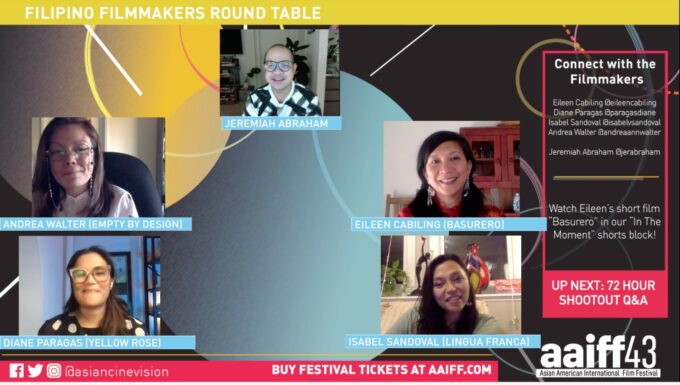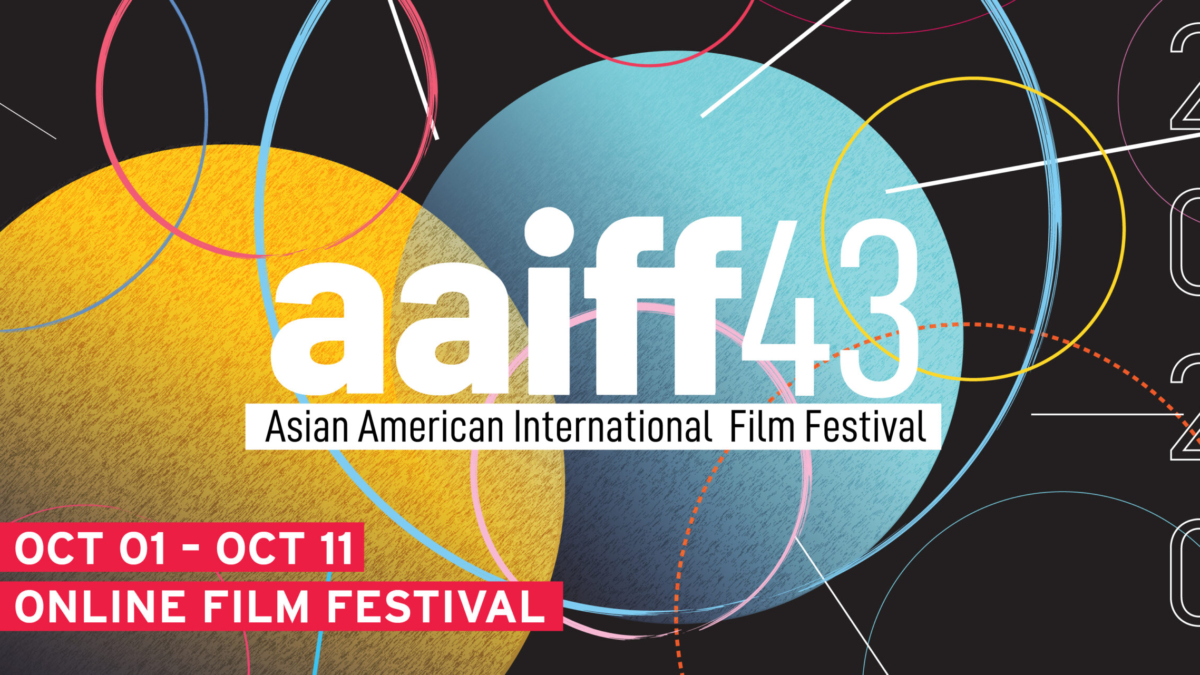Written By: Saiya Floyd
It was hard for the panelists of the Filipino Filmmakers Roundtable at AAIFF43 to imagine such a gathering as little as five years ago. A common theme for the night was how far, and how quickly the Filipino filmmaking community has come.
Moderated by Jeremiah Abraham (Tremendous Communications), the panel featured four rising Filipino filmmakers: Andrea Walter (“Empty by Design”), Eileen Cabiling (“Basurero”), Diane Paragas (“Yellow Rose”) and Isabel Sandoval (“Lingua Franca”).
The panelists are at different parts of their careers, and the majority have found their plans disrupted by the current COVID-19 pandemic. Paragas’s “Yellow Rose” is set to be one of the first Filipino American films to be distributed by a major Hollywood studio (Sony), but its release will be somewhat muted by the number of theaters still closed across North America. The film is full of music and songs, and Paragas made it with a theatrical experience in mind. “It’s a film that wants to be with a crowd. I wanted people to experience it in a dark room together and have this shared emotional experience,”
Cabiling too, made her film with a theatrical experience in mind. “Basurero” is her debut film as a director. Having the film projected would have yielded the best watching experience, as the film has limited dialogue and strong visual style. Still, Cabiling is pressing forward, showing the film in virtual festivals. Her short is a standalone, but she is also developing it into a feature.
Sandoval’s “Lingua Franca” was originally also supposed to have a wide theatrical release in March. Instead, it was released on Netflix over the summer. This actually seemed to work out well for Sandoval and her film. “I think the streaming digital release is quite apt for a film like ‘Lingua Franca.’ It’s gaining its viewership through word of mouth.”
Walter was the sole panelist not currently promoting a film. Instead, she is writing and developing new films. After a previous successful film festival circuit, she had people reaching out to her at the start of lockdown when they realized they would have time to read scripts. Some of those ideas are now being developed including a western period piece with Filipino characters, though Walter could not say much more than that at this time. The interest in the western surprised her, as she thought it was the least likely to have anyone want to make it. But it’s a sign of a changing media landscape. “People like Diane and Isabel have opened up the doors for someone like [me] to actually be able to tell different stories. If they hadn’t made their big movies, I would never get a chance to be like ‘I want to put a Filipino on a horse and shoot people! You down?’”

The evening had a consistent thread of gratitude woven throughout, with the filmmakers singing each other’s praises and emphasizing the need for Filipino filmmakers to support each other. “Being Filipina within the Asian world of cinema … we’re often looked at as second class citizens,” said Paragas. “We’re starting to become taken seriously. It feels a little bit like a movement.” An important part of that movement is seeing each other’s films and supporting each other in other ways, such as through a Filipino filmmaker group on Facebook where the panelists had crossed paths.
Walter — of mixed Filipina and English descent — spoke of how a support system made her career possible. “If it wasn’t for the community, I would never have made a Filippino movie. I was far too scared, because I’m very white passing, I don’t even have an English accent or a Filippino accent — I don’t know what I am.” Through the encouragement of new friends, and groups like CAPE and other organizations around Los Angeles, she felt encouraged to start telling her stories. She — and the Fillippino American filmmaking community have come a long way. “If we keep telling our genuine stories, I feel like from where we’re at now, 10 years from now, it’s going to be insane. It’s going to be awesome. It’s going to be a big celebration,” Walter said. “Filipinos are known for having community and family, so we just have to hold onto our strongest part of us which is family, and just keeping pushing all of us.”
Despite the strong feeling of community support, the panelists also spoke of feeling pressure to have perfect films and to tell a certain kind of story, but were united in their wish for more freedom in their choice. “We all just want to stand on our own as artists and not be defined as a Filipino artist. But in the meantime, how we get there is to support each other and how we get there is to respect each other’s work and promote each other’s work,” said Paragas.
“We’re a culture that’s made up of so many layers and so many cultures and so many stories to be told,” Cabiling said. And though there are many stories and paths for each of the filmmakers to take, they recognize there is power in the community they are forging. To Paragas, it’s simple. “The success of each of us is the success of all of us.”

